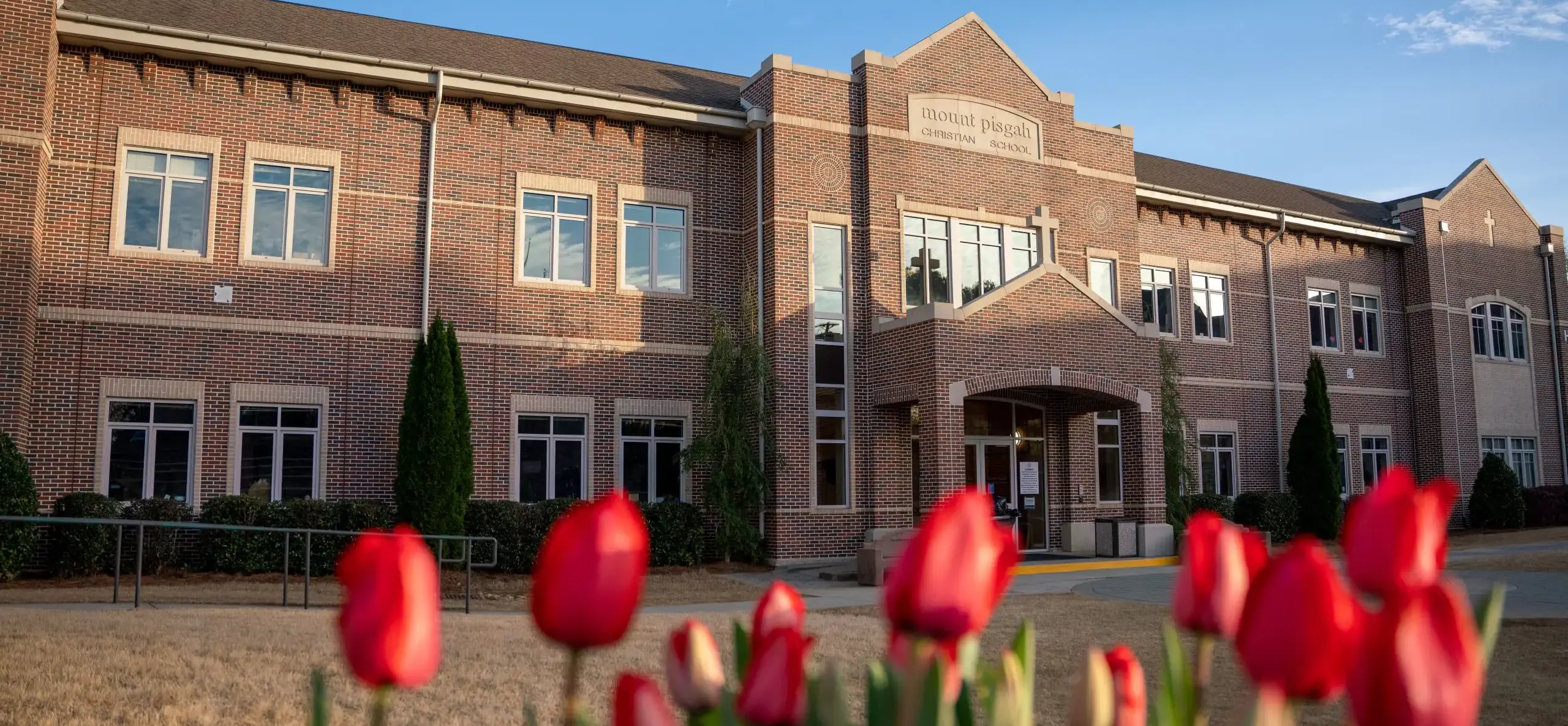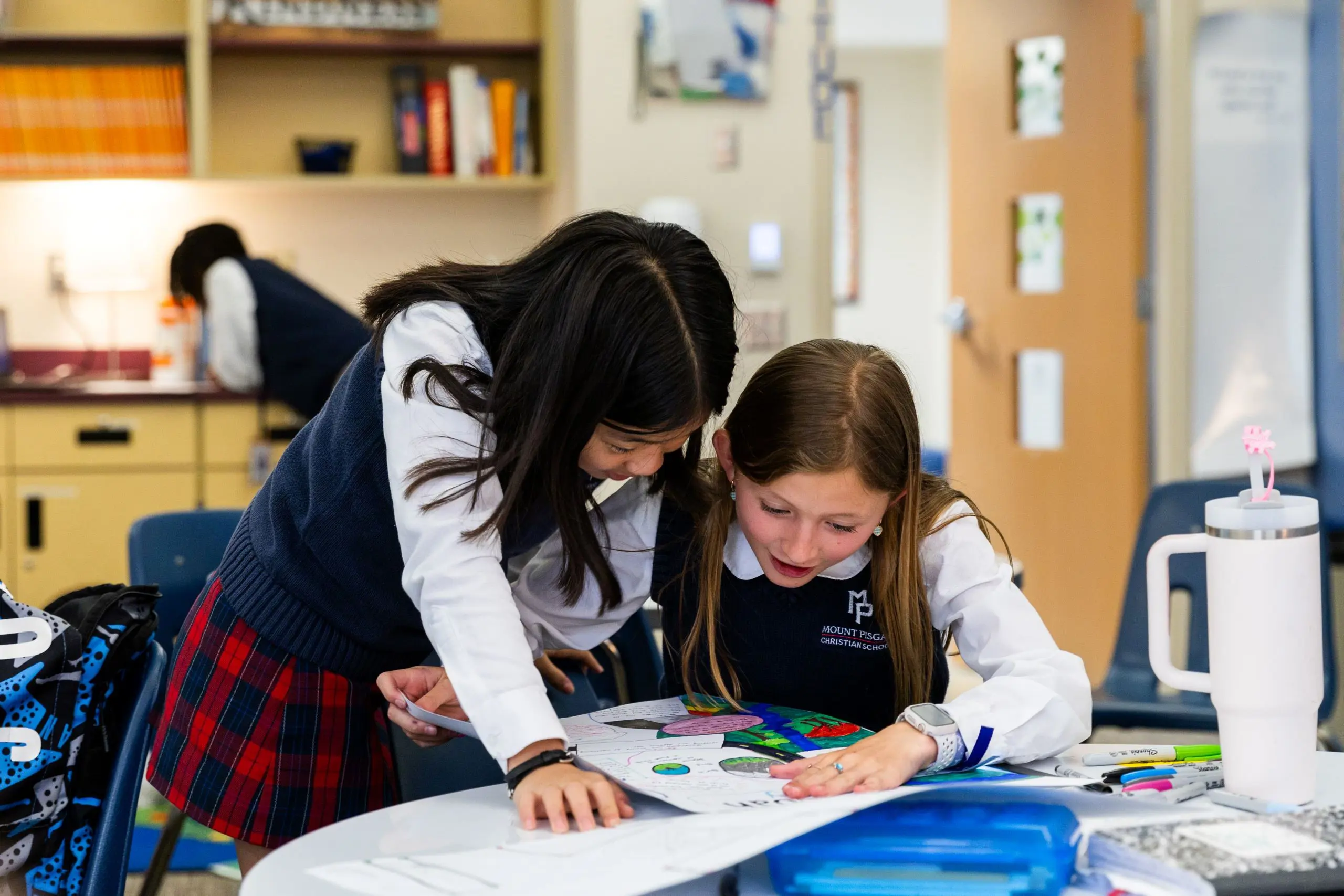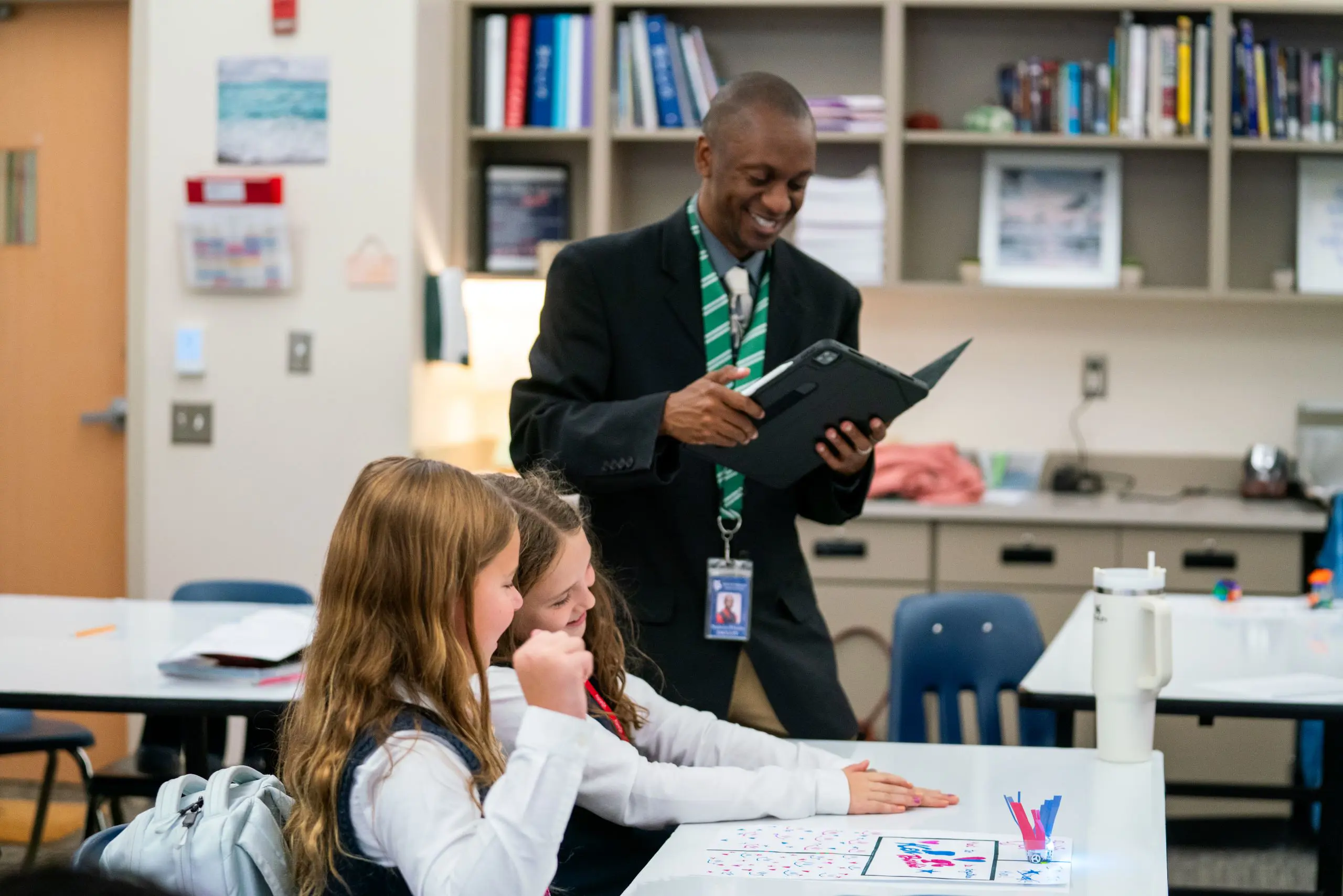In grades 5-8, the MPCS curriculum makes connections to God, Biblical truths, and a larger Christian worldview.
Students are empowered to think critically and creatively and to act with courage and compassion. Courses are carefully aligned vertically and horizontally to ensure a robust and well-rounded education.
| MATH |
|---|
| Instructional time focuses on three critical areas: (1) developing fluency with addition and subtraction of fractions, and developing an understanding of the multiplication of fractions and of the division of fractions in limited cases (unit fractions divided by whole numbers and whole numbers divided by unit fractions); (2) extending division to 2-digit divisors, integrating decimal fractions into the place value system and developing an understanding of operations with decimals to hundredths, and developing fluency with whole number and decimal operations; and (3) developing an understanding of volume. A priority is placed on conceptual understanding (comprehension of mathematical concepts, operations, and relations) and procedural fluency (skill in carrying out procedures flexibly, accurately, efficiently, and appropriately). |
| ENGLISH LANGUAGE ARTS |
|
Students focus on the development of cross-curricular reading comprehension. They learn to visualize, ask higher-level thinking questions, make inferences, determine main ideas, summarize, synthesize, and make text-to-text, Biblical, and real-life connections. Reading activities include “read-alouds,” which expose students to high-level text and new vocabulary and explicitly teach comprehension strategies, independent daily reading, teacher/student conferencing, partner and small group discussions, graphic organizers, interactive journals, “Think Trix” questioning, and projects. The class will include elements from Collaborative Classroom, Shurley Grammar and Jane Schaffer writing program, which is designed as a scaffolding technique to foster and enhance the clarity and organization of student writing. Students often struggle with the “blank page” and the Schaffer structure offers them a tangible and straightforward basis for clear, concise and insightful writing. The Schaffer format also provides for a common language to be shared across the curriculum and is meant to be used in every subject where writing is required. In middle school and high school, this common language is especially beneficial for students and teachers. Grammar skills are enhanced in a separate class. |
| BIBLE |
|
This course is an overview of scripture and will survey the Old Testament in the fall and the New Testament in the spring. Students will read and interact daily with God’s Word, learning to identify and understand main characters, concepts, and themes. They will learn to dive in and examine details (what exactly is going on here?) as well as step back to consider the overarching significance of each passage (what does this say about God and his plan?). The narrative format of the class builds from creation and the chosen people of Israel to the grand climax of Christ’s coming to die and resurrect in order to save humanity. The course will conclude with practical application of how to live in light of this good news until Jesus returns. Throughout the course, students will have opportunities to consider and apply the truth of scripture to their own lives as they develop a faith walk of their own. |
| ANCIENT WORLD HISTORY |
|
Ancient world history provides students with a global perspective that evaluates connections and changes over time. The course examines the geographical, cultural, political, and socio-economic connections among the peoples of the ancient world. Moreover, the course emphasizes critical thinking, analytical skill development and a Christian worldview to help students contemplate complex concepts with a grounding in Christian faith and values. History class will also include student's writing prompts for nonfiction readings. |
| DISCOVERING SCIENCE |
|
Fifth-grade science is a general science course where students will investigate Earth, Life, and Physical science concepts. The course is designed to provide an engaging discovery experience as students explore the various aspects of these content strands. Students will be empowered to think critically and creatively while being encouraged to act with courage and compassion -- all for the purpose of equipping them to have a positive impact in our ever-changing world. The enduring understandings will be connected to God, Biblical Truths, and/or a larger Christian worldview. Students will have opportunities to discover these concepts through hands-on, inquiry-based activities. Science also includes our Coding with Color curriculum as part of the school's STEAM initiative. |
| MATH |
|---|
| This course meets and in many instances exceeds the standards set forth by national and state standards for the sixth-grade year. The sixth grade standards are arranged into units that will extend their knowledge and understanding of elementary topics into applicable skills as they transition into upper grades. The Standards for Mathematical Practice are a key component as they are applied in each course to equip students in making sense of problems and building a set of tools they can use in real-world situations. The elementary grades focused on concepts, skills, and problem-solving related to addition and subtraction, multiplication and division of whole numbers, and fractions. In grade 6, the focus is on ratios and proportional relationships, and early algebraic expressions and equations. |
| READING And Writing |
|
Sixth Grade Reading and Writing is an interactive process that involves thinking, questioning, discussing, rereading, and responding to texts. In Making Meaning lessons, carefully selected nonfiction and fiction read-aloud texts provide a platform for rich discussions as students encounter increasingly complex texts and build vocabulary. Lessons intentionally integrate academics with social skill development, creating an environment where students learn to collaborate, agree, and disagree respectfully and take responsibility for their own learning. We use the Jane Schaffer writing program, which is designed as a scaffolding technique to foster and enhance the clarity and organization of student writing. Students often struggle with the “blank page” and the Schaffer structure offers them a tangible and straightforward basis for clear, concise and insightful writing. The Schaffer format also provides for a common language to be shared across the curriculum and is meant to be used in every subject where writing is required. In middle school and high school, this common language is especially beneficial for students and teachers. Grammar skills are enhanced in a separate class. |
| BIBLE |
| In this course, students will explore in an in-depth study on the life of Jesus Christ. The first half of the course will focus on a scriptural study of his nature and character, authority, ministry, and sacrificial atonement for the sins of humanity. The second half of the course will consider how to respond to the good news of Jesus Christ, growing personally in discipleship. Students will learn basic Christian practices including methods for studying scripture, how to pray, and how to live in Christian community with one another. |
| MODERN WORLD HISTORY |
| Sixth-grade world history is a continuation of the fifth-grade curriculum. The course begins with an emphasis on both historical and geographical skill development. Using these skills, the course then focuses more intently on historical information from 1200–the 2000s. Skill development will continue to be interspersed with historical understanding for the entirety of the year and will be addressed using a global perspective that looks for and evaluates connections with different periods/regions and changes over time. |
| EARTH SCIENCE |
| Science consists of a way of thinking and investigating, as well as a growing body of knowledge about the natural world. This course provides an engaging discovery experience as students explore the universe, bodies of water, weather, and geology. Students will be encouraged to consider all of this content in terms of the value beyond the classroom. Students will also explore Animation as a way to demonstrate mastery in this course and others. |
| MATH |
|---|
| This course covers the 7th-grade mathematics standards to continue the path that is started in kindergarten. There is a large emphasis on operations with rational numbers which will be continued throughout the year. Students will further develop their algebraic thinking skills through the solving of two-step equations and inequalities, explore theories of similarity through geometry, and determine relationships between numbers through ratios and rates, and make inferences about a population based on random sampling. |
| PRE-ALGEBRA ADVANCED |
| This course uses a combination of 7th and 8th-grade mathematics standards after which students will be prepared to enter Algebra I. There is a large emphasis on operations with rational numbers which will be continued throughout the year. Students will further develop their algebraic thinking skills through the solving of multi-step equations and inequalities, explore theories of congruence and similarity through geometry, determine relationships between numbers with ratios and slope, and make inferences about a population based on random sampling. |
| ENGLISH LANGUAGE ARTS |
| Students will explore and understand the past, present, and future through literature and writing in this course. By reading various genres of literature, students will broaden, relate to, and share each other’s perspectives. Genre units immerse students in grammar and writing by hearing, reading, and discussing exemplary writing examples in each genre. Writing instruction utilizes the Jane Schaffer writing program, which is designed as a scaffolding technique to foster and enhance the clarity and organization of student writing. |
| US HISTORY |
| U.S. History is a required year-long survey course that focuses on major events in American History. Students will continue their study of United States history from the years past and grow as informed citizens. Students will be able to locate, analyze, and synthesize information related to social studies topics. They will apply information to solve problems and make decisions. We will use primary and secondary sources to view multiple perspectives in order to fully understand the motivation of people and events that have shaped our nation. Students will participate in a variety of research projects and will practice the writing skills necessary to write well-developed answers for constructed response-type questions. Students will also learn how to use maps to retrieve information and use a variety of sources to answer questions. Thematically, students will analyze the growth of and challenges to freedom within the United States, the changing role of the United States in the world, and the evolution of American economic power. |
| LIFE SCIENCE |
| Seventh-grade students will keep logs of their observations, use those observations to analyze data, determine patterns in the data, create and/or read charts and graphs to represent the patterns they see and find more than one way to translate their findings in order to explain relationships between those patterns. Students will use this process to explain the diversity and classification of living organisms, how they reproduce and how inherited traits are passed from parents to their offspring. They will create and use different models to exhibit different levels within body systems. They will use prior knowledge about ecosystems to determine how matter and energy cycle through an ecosystem. They will explain the diversity of life using the ideas of natural selection. |
| BIBLE |
| This course is an exploration in biblical wisdom and foolishness. Students will learn about these concepts through Solomon’s writings (namely, Proverbs), as well as the books of Esther and Job, and the letter from James (the New Testament companion to Proverbs). Wise Up is a practical course that will teach students the value of employing wisdom in relationships with friends and family and the pivotal need for discerning truth in a complex world. To conclude this course, students will take part in a vibrant study of the historic Ten Boom Family via the novel The Hiding Place to analyze the costs and benefits of living out God’s wisdom in uncertain times. |
| MATH / PRE-ALGEBRA |
|---|
| 8th-grade mathematics is the last in a 9-year sequence of integrated mathematics courses focusing on a variety of mathematics topics. In Grade 8, instructional time should focus on three critical areas: (1) formulating and reasoning about expressions and equations, including modeling an association in bivariate data with a linear equation, and solving linear equations and systems of linear equations; (2) grasping the concept of a function and using functions to describe quantitative relationships; (3) analyzing two- and three-dimensional space and figures using distance, angle, similarity, and congruence, and understanding and applying the Pythagorean Theorem. |
| ALGEBRA I ADVANCED |
| Algebra I Advanced is the first course in a sequence of three required courses designed to ensure career and college readiness. The fundamental purpose of Algebra I is to formalize and extend the mathematics that students learned in the earlier grades. Students will deepen and extend their understanding of functions and the relationships between quantities by comparing and contrasting linear, quadratic, and exponential phenomena. The Mathematical Practice Standards apply throughout each unit and, together with the content standards, prescribe that students experience mathematics as a coherent, useful, and logical subject that makes use of their ability to make sense of problem situations. |
| ENGLISH LANGUAGE ARTS |
| Students will explore and understand the past, present, and future through literature and writing in this course. By reading various genres of literature, students will broaden, relate to, and share each other’s perspectives. Genre units immerse students in grammar and writing by hearing, reading, and discussing exemplary writing examples in each genre. Writing instruction utilizes the Jane Schaffer writing program, which is designed as a scaffolding technique to foster and enhance the clarity and organization of student writing. |
| ENGLISH LANGUAGE ARTS |
| This course combines reading and writing disciplines by emphasizing the importance of creating a community where students can learn and share. By reading units that include nonfiction and fiction texts, students learn comprehension and self-monitoring strategies that proficient readers use to make sense of texts. Writing instruction utilizes the Jane Schaffer writing program, which is designed as a scaffolding technique to foster and enhance the clarity and organization of student writing. Students publish argumentative, narrative, and informative pieces throughout the year. |
| THE UNITED STATES CIVIC AND COMPARATIVE GOVERNMENT |
| The United States Civics and Comparative Government course is designed to provide students with a comprehensive understanding of the foundations of American government and its comparison with other political systems. Through engaging discussions, interactive activities, and critical analysis, students will explore the foundational principles, structures, and functions of government in the United States, as well as examine key concepts in comparative government. By the end of the course, students will gain a solid understanding of the fundamental aspects of the United States government and a broad awareness of comparative governments, empowering them to become informed, engaged, and responsible citizens. |
| PHYSICAL SCIENCE |
| Using an inductive approach to science education, this course provides an atmosphere in which students can continue to learn to explore the world of science through a variety of activities. By incorporating differentiated classroom instruction, class discussion, technology, and lab activities, students will become even more familiar with experimentation and the scientific method, manipulating scientific equipment in lab settings, and analyzing and communicating scientific data. The topics covered in this course include laws of energy, motion, and gravity, states and classification of matter, an introduction to chemistry and chemical reactions, electricity and magnetism, electromagnetic and sound waves, and energy resources. Throughout the year students are required to: practice safety in lab procedures, develop science processing skills, establish a working vocabulary of science terms, explore science concepts utilizing reference and technological resources, and develop an appreciation of all God’s creation through scientific theory. |
| BIBLE - LEADERSHIP |
|
This course weaves the study of biblical worldview together with the study of Christian leadership. The course will be an ongoing examination of various worldviews alongside a survey of godly leadership traits, with the goal of learning how to identify biblical truth and lead others toward it. Students will use John Maxwell’s 21 Qualities of Leaders in the Bible to analyze biblical figures who demonstrated leadership, to discuss how to stand for truth in an ever-changing world, and to be challenged on how to grow personally in a student’s area of influence. Students will learn about historical Christian leaders and watch films related to the leadership traits being studied. Units will conclude with a project that analyzes the implementation of those traits in a real-life setting. Throughout the course, students will build a portfolio of profile pages highlighting known or historical leaders. As a means of practical application, students will be given the opportunity to implement leadership skills through an ongoing mentor partnership with the children of the Murray Academy (PreK3-4) on campus. |
World LANGUAGE
Successful completion of this course earns students progression credit and will not appear on Upper School transcripts.
| SPANISH 1 (8TH GRADE) |
|---|
| This course covers the second half of the Upper School Spanish 1 curriculum. Students will be able to talk about their homes, sports, health and daily routines, travel, and shopping. They will also learn about different Spanish-speaking peoples and cultures. Students who successfully complete Spanish 1B will be promoted to Spanish 2 or Spanish 2 Honors as ninth graders. |
| LATIN 1 (8TH GRADE) |
|
In the second half of first-year Latin, we will continue to hone skills related to Latin nouns and verbs, but add some aspects of adjectives, adverbs, and prepositions. There will be a variety of cultural lessons as well, ranging from Roman politics to religion to dining practices. The students will continue to augment their knowledge of English by careful examination of Latin and Greek roots daily. This course covers lessons 11-20 in the textbook Jenney’s First Year Latin. Students who successfully complete Latin 1B will be promoted to Latin 2 as ninth graders. |





